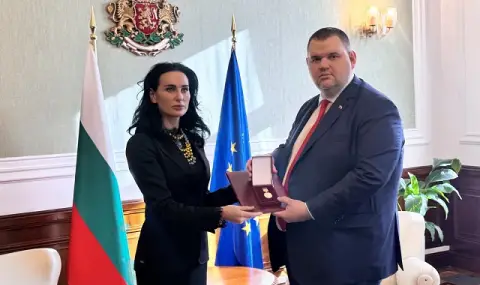This question causes dumb bewilderment among many in Bulgaria: why exactly did Delyan Peevski receive a medal for special merits to the Ukrainian people? There are two possible answers. Comment from Alexander Andreev:
With dumb bewilderment, many in Bulgaria (with the exception of the medalist Mr. Delyan Peevski) are scratching their heads over the question: Why exactly a person sanctioned by the USA and Great Britain for corruption received from the chairman of the Verkhovna Rada in Ukraine, Ruslan Stefanchuk, a medal for special merits to the Ukrainian people?
Possible answers
There are two possible answers. First, this may indeed be a standard procedure, as can be understood from the explanations of the Ukrainian Deputy Ambassador to Bulgaria, Anna Tertychna, to the BNR. That is, a gesture of gratitude to "leaders of key political parliamentary forces in Bulgaria, who consistently support decisions to help Ukraine in conditions of Russian aggression".
"Diary" wrote in turn that Kiril Petkov also received the same medal, and in January of this year Ukrainian President Volodymyr Zelensky thanked Boyko Borisov, Kiril Petkov and Delyan Peevski for the decisions of their parliamentary groups in support of Ukraine in a video conference call. At that time, Peevski was not yet the co-chairman of the DPS, but he was the chairman of the parliamentary group, the publication specifies. Those who are more mindful also remember that in the period before that, PP-DB inadvertently entered into cooperation with Borisov and Peevski, which the latter described to the public in a, to put it mildly, vulgar way. But the topic of Mr. Peevski's mentality and morality is secondary in this case.
The second possible answer should be looked for behind the phrase "support for Ukraine". Is it just about political support, as it seems at first glance? Or does Mr. Peevski have some (financial?) involvement in the aid that Bulgaria provided to Ukraine, mostly with fuel, weapons and ammunition already in the first months after the criminal invasion of the Russian troops in the country? Here we can recall the investigation of the German "Di Welt" under the significant title "Bulgaria: the country that secretly saved Ukraine". But the hypothesis that Mr. Peevski helped Ukraine out of his own pocket does not stand up to criticism, simply because he would have long since boasted about his contribution. And he not only boasted, but also knocked on the door of the State Department in Washington with the relevant "receipt" and with the urgent request to remove him from "Magnitsky".
Because that's what it's all about: most of the moves that this body politic has been making lately, all the hollow-sounding "Euro-Atlanticism", are actually a thirst for the secondary legitimization of Mr. Peevski in front of the powerful of the day and the lifting of sanctions against him . And even more precisely: at the moment, Mr. Peevski probably just saw the opportunity to catch some fish in the murky waters of international politics.
Just think: the USA is in transition from one president to another and hardly anyone thinks of Bulgaria; until the other day, there was no active European Commission in Brussels; in NATO, the new Secretary General has just taken office; in Germany the government collapsed; in France, Macron is already a shadow of himself. And so on and so forth. What better time than this could be chosen by a skillful and apparently unscrupulous politician who wants to position himself at the political table not only in Bulgaria, but also in "Euro-Atlantic"?
As if fallen from the sky
And at that very moment, the Ukrainian medal just fell from the sky. To the question "Why?" a new and different answer is unlikely to come from Kiev, and the Ukrainian Rada is unlikely to reverse its decision. At the moment, the Ukrainians do not like Mr. Delyan Peevski at all, and the ill-fated medal cannot in any way balance the scales against the enormous political weight of the sanctions under the "Matnitsky" law. Let alone whiten Peevski's political collar.
So under the line remains the mentioned dumb bewilderment in its original form: Why, unlike the USA and Great Britain, the conflict-torn Bulgarian justice system still cannot find out if the person in question is really involved in corruption? And to answer in a clear way to all those who claim that Mr. Delyan Peevski has taken the whole country hostage. A statement that resonates even more distinctly after the last parliamentary elections.
*****
This comment expresses the personal opinion of the author and may not coincide with the positions of the Bulgarian editorial team and of DV as a whole.
